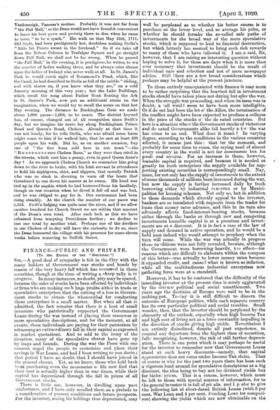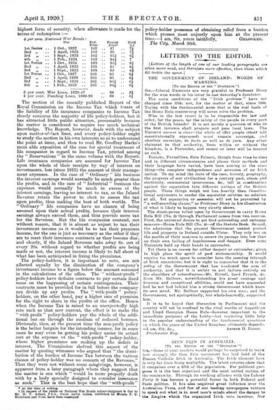FINANCE—PUBLIC AND PRIVATE.
ET0 IRE EDITOR Or r" SPECTATOR "3 Sra,—A good deal of sympathy is felt in the City with the many holders of Government war stocks and bonds by reason of the very heavy fall which has occuared in those securities, though at the -time of writing a sharp rally is in progress. In many instances, no doubt, pity may be spared, because the sales of stocks have been effected by individuals or firms who are making such huge profits either in trade or speculative enterprises that the cutting of a loss in Govern- ment stocks to obtain the wherewithal for conducting these enterprises is a small matter. But -when all that is admitted, the fact remains that there is a host of small investors who patriotically supported the Government Loans during the war instead of placing their resources in more speculative descriptions, and for the moment, at all events, these individuals are paying for their patriotism by witnessing an extraordinary fall in their capital as expressed in market quotations. And to add to the irony of the situation, many of the speculative shares have gone up -by leaps and bounds. During the war the Press with one consent urged the people to economize and place their savings in War Loans, and had I been writing to you during that period I have no doubt that I should have joined in the general chorus. Yet, as we know, those who held back from purchasing even the necessaries ot life now find that their cost is actually higher than in war times, while their -capital has depreciated through the fall in prima -of all Government stoc re.
There is little use, however, in dwelling upon past misfortunes, and I have only recalled them as a prelude to a consideration of present conditions and future prospects. For the investor, seeing his holdings thus depreciated, may well be perplexed as to whether his better cburse is to purchase at the lower level, and so average his price, or whether he should forsake the so-called safe paths of investments for the broad way of the more speculative stocks, which is supposed to lead to financial destruction, but which latterly has seemed to bring such rich rewards to many of those who have I ollowed it. I am a raid, Sir, however, that I am raising an interesting question without hoping to solve it, for these are days when it is more than ever necessary that investment should be the result of individual care and selection and not of mere newspaper advice. Still there are a few broad considerations which perhaps may be helpful at the present juncture.
To those entirely unacquainted with finance it may seem to be rather surprising that the heaviest fall in investment stocks should have taken place not during but after the war. When the struggle was proceeding, and when its issue was in doubt, a i all wadi seem to have been more intelligible. Or if de eat had been the lot of the Allies, the termination of the conflict might have been expected to produce a collapse hi the price of the stocks o; the de eated countries. But here is a situation where the Government stocks of victorious and de eated Governments alike fall heavily a.t u the was has come to an end. What does it mean ? In varying degree, according to the conditions in the various countries affected, it means just this : that for the moment, and probably for some time to come, the crying need of almost every country in the world is not for investments but for goods and services. For an increase in these, however, loanable capital is required, and because it is needed so greatly for fresh enterprises the supply available for sup- porting existing securities is correspondingly small. Nay, more, for not only has the supply of investments to the extent of some thousands of millions been increased during the war, but now the supply is further increased daily by fresh borrowing either by industrial concerns or by Munici- palities for housing schemes. Not only so, but in addition to these demands which directly appeal to the investor, bankers are so inundated with requests from the trader for loans that money rates advance, and. this in its turn also adversely affects fixed-interest-bearing stocks, because either through the banks or through new and competing investments loanable capital is at a premium and invest- ments are at a discount. It is in fact a case of the law of supply and demand. in active operation, and he would be a bold man indeed who would attempt to prophesy when the turn will come. While the' war was actually in progress these conditions were not fully revealed, because, although the Government were borrowing heavily, t ie effect—for reasons which are difficult to elaborate within the compass of this letter—was actually to lower money rates because it expanded credit, and camel what is known as inflation, while all the multitudinous industrial enterprises now gathering force were at a standstill.
Moreover, it has to be confessed that the difficulty of the intending investor at the present time is sorely aggravated by the intense political and social unsettlement. Two years ago the destinies of Europe were said to be in the melting-pot. To-clay it is still difficult to discern the outcome of European politics, while each -separate country has its own particular political and social troubles. Small wonder, then, that the investor should be perplexed by the obscurity of the outlook, especially when high Income Tax and high cost of living act as a force constantly impelling in the direction of stocks giving high yields. Nevertheless I am entirely disinclined, despite all past experience, to counsel any departure from the highest class of securities, fully recognizing, however, the risk of still further depreci- ation. There is one point which it may perhaps be useful for -the investor to remember now that Government Loans stand at such heavy discounts—namely, that capital appreciation does not come under Income Tax claim. That of course is why for the past two years there has been such a vigorous hunt around for speculative descriptions at a big discount, the idea being to buy not for dividend yields but for higher prices. This is a course, however, which must be left to those with special sources of information, for to the general investor it is full of pit ails, and. I p efer to give the following list of short-dated British Loans (with 5 per cent. War Loan and. 4 per cent. Funding Loan for compari- son) showing the yields which are now obtainable on the
• At the time of writing.
t In respect of the yields on National War Bonds acknowledgment Is due to Mr. H. T. Adlard. Fiat.. whose useful tables. nubll.hed. by Messrs. F. 0. Idathieson and Sons. hare been employee_ highest form of security, when allowance is made for the terms of redemption :—
Yield %t 7f 7} 61 7 61 61 61 61 6f 6f 61 .. 51 .. 51
The section of the recently published Report of the Royal Commission on the Income Tax which treats of the liability of life insurance companies to Income Tax closely concerns the majority of life policy-holders, but it has attracted little public attention, presumably because the matter is considered to require too much technical knowledge. The Report, however, deals with the subject upon matter-of-fact lines, and every policy-holder ought to study the section in his own interests so as to understand the point at issue, and then to read Mr. Geoffrey Marks's most able exposition of the case for special treatment of life companies in regard to Income Tax, printed among the " Reservations " in the same volume with the Report. Life insurance companies are assessed for Income Tax upon the whole of their receipts by way of interest on investments, less (since 1915) the amount of their manage- ment expenses. In the case of " Ordinary " life business the interest earnings would normally be much greater than the profits, and in the case of " Industrial " business the expenses would normally be much in excess of the interest earnintiz, leaving no interest to tax, so the Inland Revenue retain the power to elect to assess the tax upon profits, thus making the best of both worlds. The " Ordinary " life companies have no chance of being assessed upon their actual profits, because their interest earnings always exceed them, and thus provide more tax for the Revenue. But the life companies contend, not without reason, that it is almost as unjust to tax their investment income as it would be to tax their premium income, for the one is just as necessary as the other if they are to meet their insurance contracts as they become due; and clearly, if the Inland Revenue take away 6s. out of every 20s. without regard to whether profits are being made or not, the interest income is likely to fall short of what has been anticipated in fixing the premiums. The policy-holders, it is important to note, are not affected equally by the diminution of the company's investment income to a figure below the amount assumed in the calculations of the office. The " without-profit " policy-holders have definite contracts to pay certain fixed sums on the happening of certain contingencies. Their contracts must be provided for in full before the company can divide up any profits. The `: with-profit" policy- holders, on the other hand, pay a higher rate of premium for the right to share in the profits at the office. Hence when the Income Tax is raised to an unexpectedly high rate such as that now current, the effect is to make the "with profit" policy-holders pay the whole of the addi- tional bkirlen through the medium of reduced bonuses.
Obviously, then, at the present time the non-profit policy Is the better bargain for the intending insurer, for in some eases he may even be getting his policy under its actual :oat at the expense of the " with-profit " policy-holder, whose higher premiums are making up the deficit in interest. The Commission shelved this aspect of the matter by quoting witnesses who argued that "the distri- bution of the burden of Income Tax between the various classes of policy-holder was no concern of the Revenue." That they were not without some misgivings, however, is apparent from a later paragraph where they suggest that the matter is one which "would be more properly dealt with by a body specially designed to consider insurance as such." This is the best hope that the " with-profit " 6 per eieta. National War Bonds :
DUO
Bed. Price.
Present Price* let Series • • 1 Oct., 1922 • • 102 • • 97 2nd „ • • 1 April, 1923 • • 102 • • 96 3rd „ • • 1 Sept., 1923 • • 102 • • 951 4th „ • • 1 Feb., 1924 • • 102 • • 94f 1st Series • • 1 Oct., 1924 • • 103 • • 951 2nd „ • • 1 April, 1925 • • 103 • • 95 3rd „
1 Sept., 1925 • . 103 • • 95 let Series
1 Oct., 1927 • • 105 • • 95 2nd „ • • 1 April, 1928 • • 105 • • 95 3rd „ • .
1 Sept., 1928
• • 105 • • 941 4th „ • • 1 Feb., 1929 • • 105 • • 941 5 per cent. War Loan, 1929-47
88 4 per cent. Funding Loan, 1960-90
68
policy-holder possesses of obtaining relief from a burden which presses most unjustly upon him at the present time.—I am, Sir, yams faithfully, 019LOOKRA. The City, March 30th.



































 Previous page
Previous page